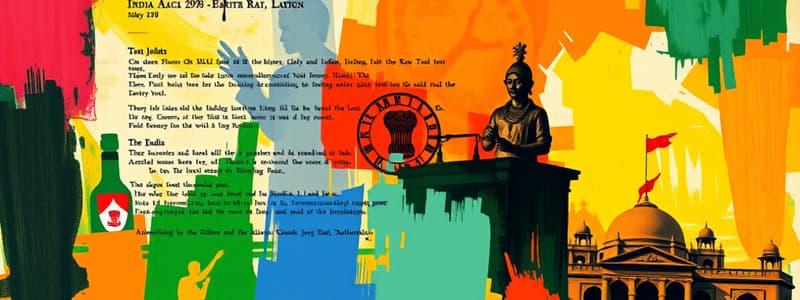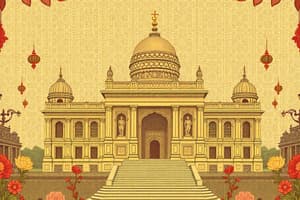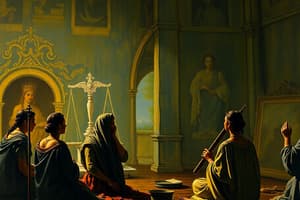Podcast
Questions and Answers
India gained independence on ______.
India gained independence on ______.
15 August, 1947
An absence of rules causes confusion and ______.
An absence of rules causes confusion and ______.
chaos
Indians had no say in matters relating to their own ______.
Indians had no say in matters relating to their own ______.
country
The struggle for freedom was under the leadership of ______.
The struggle for freedom was under the leadership of ______.
Many people were uneducated and divided by the ______ system.
Many people were uneducated and divided by the ______ system.
Equality among the people could be achieved by making it a ______.
Equality among the people could be achieved by making it a ______.
The guiding principles of the Indian Constitution include ______, liberty, and fraternity.
The guiding principles of the Indian Constitution include ______, liberty, and fraternity.
The British imposed certain rules on the Indians when they came to ______.
The British imposed certain rules on the Indians when they came to ______.
Flashcards are hidden until you start studying
Study Notes
The Indian Constitution
- The Indian Constitution is the supreme legal document that outlines the framework of governance, rights, and duties within the country.
- It was framed to establish a system of governance that ensures law and order, maintaining equality among citizens.
The Framing of The Constitution
- The Constitution of India was drafted by the Constituent Assembly, which was formed to create a set of laws governing newly independent India.
- The assembly consisted of prominent leaders and representatives from various states, reflecting diverse views and interests.
The Nature of the Indian Constitution
- The Indian Constitution is characterized as sovereign, socialist, secular, democratic, and republican, aiming to secure justice, liberty, equality, and fraternity for all citizens.
- It emphasizes the principle of inclusivity, ensuring that all citizens have equal rights and opportunities.
The Need for a Constitution
- A constitution is essential to prevent chaos and confusion, establishing a clear set of rules for governance similar to rules maintained in schools and other institutions.
- Prior to independence, Indian citizens had no control over their governance due to colonial rule by the British, highlighting the necessity for self-governance and legal order.
The Preamble to the Indian Constitution
- The Preamble serves as an introductory statement that outlines the fundamental purposes and guiding principles of the Constitution, emphasizing democracy and social justice.
- It articulates key values such as equality, liberty, and fraternity, forming the philosophical basis for the Constitution.
The Guiding Principles of the Indian Constitution
- The Constitution promotes principles like social, economic, and political justice, ensuring the protection of individual rights against discrimination.
- It establishes a parliamentary system in which a central government functions with various checks and balances to prevent abuse of power.
Key Terms
- Constitution: A formal document outlining the fundamental laws of a nation.
- Equality: A principle ensuring all individuals have the same legal rights.
- Liberty: The state of being free within society from oppressive restrictions.
- Fraternity: Promotes brotherhood and solidarity among citizens.
- Sovereign: The authority of a state to govern itself.
- Socialist: A system emphasizing social equality and collective ownership.
- Secular: Ensuring the separation of religion from governmental institutions.
- Democratic: A system in which the government is elected by the people.
- Republic: A state in which power rests with the people and their elected representatives.
- Justice: The concept of moral rightness and fairness in law.
- Parliament: The legislative body in the government.
- Preamble: The introductory statement to the Constitution explaining its purpose.
- Constituent Assembly: The body responsible for drafting the Constitution.
- Central Government: The national government that governs the entire country.
Studying That Suits You
Use AI to generate personalized quizzes and flashcards to suit your learning preferences.




